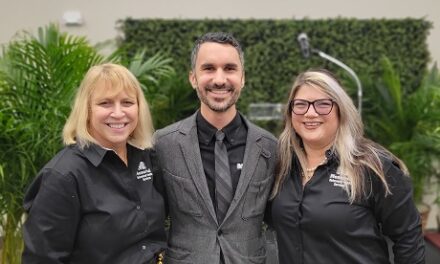One of the most common complaints among hospital patients nationwide is physical access to healthcare facilities, according to a recent report by Health Grades, an independent healthcare ratings organization. In fact, three out of five patients list physical access to the facility as their number one complaint.
Many of the patients who are parking in a garage or lot may have very limited walking distance tolerances due to medical conditions, physical limitations, age, and other factors. In addition to limited and inconvenient parking availability, some of the parking garages on medical campuses are sometimes difficult to navigate around and many are dark. Finding a parking space or parking too far from the entrance should be the last thing on these patients minds. Healthcare facilities are striving to improve physical access to their facilities by offering convenient services like full-service valets and ambassadors for patients and visitors alike. Its critical that healthcare facilities place a priority on patient and visitor access, stresses Ricky Chandler, who manages the Healthcare Solutions division of Lanier Parking. “Physical access to the facilities is one of the most common complaints of patients today,” says Chandler. “But it tends to get shoved to the back by administrators. Its just not something that they prioritize because they have more pressing matters to deal with. Parking, wayfinding, and design are the first and last impression a patient has of a facility.”
All these factors lead to a better patient/guest experience and the treatment by front line personnel are critical to the success of a healthcare facility. A nurse, receptionist, transport personnel, valet and greeters are differentiating factors in hospitals and are cited by patients as a reason to choose one facility over another.
One reason that physical access has become a challenge for patients, administrators and visitors is major capital building programs and facility changes such as new outpatient entrances, emergency department renovations and other newly constructed spaces. While many facilities are unable to add more garages or surface lots to alleviate the problem, there are other solutions.
“We look for alternative forms of transportation like shuttles, golf carts, vans, or using valets and ambassadors,” Chandler says.
While valets will handle the convenience of parking a patients vehicle, an ambassador will make them feel welcome. Need directions on where to go? An ambassador can direct patients and visitors to their location.
“Physical access to the facilities is one of the most common complaints of patients today,” says Chandler. “But it tends to get shoved to the back by administrators. Its just not something that they prioritize because they have more pressing matters to deal with. Parking, wayfinding, and design are the first and last impression a patient has of a facility.”
All these factors lead to a better patient/guest experience and the treatment by front line personnel are critical to the success of a healthcare facility. A nurse, receptionist, transport personnel, valet and greeters are differentiating factors in hospitals and are cited by patients as a reason to choose one facility over another.
One reason that physical access has become a challenge for patients, administrators and visitors is major capital building programs and facility changes such as new outpatient entrances, emergency department renovations and other newly constructed spaces. While many facilities are unable to add more garages or surface lots to alleviate the problem, there are other solutions.
“We look for alternative forms of transportation like shuttles, golf carts, vans, or using valets and ambassadors,” Chandler says.
While valets will handle the convenience of parking a patients vehicle, an ambassador will make them feel welcome. Need directions on where to go? An ambassador can direct patients and visitors to their location.
 “A patients or visitors perception of a hospital is directly affected by, not only the medical professionals at the hospital, but more importantly, by the line staff,” says Chandler. “Lanier, for example, has people trained in providing extraordinary customer service from the hospitality industry in these front line staff positions as a way to improve the patient experience. If a health facility is creating an environment of care, then all customer interaction must be carefully managed, especially the moment of their arrival and departure.”
Children’s Healthcare of Atlanta is one of the many healthcare facilities in the Atlanta area that has been using Laniers parking valet services. According to Susan McQuagge, Manager Patient & Guest Service for Childrens Healthcare, theyve been pleased with the performance of the valet staff.
“I see them go above and beyond daily to assist our families, patients, staff and visitors,” she says. “They are so pleasant and willing to provide the type of customer service that we strive for on a daily basis. I can’t praise them enough for all that they do.”
In addition to valets and ambassadors, Lanier also manages parking lots, garages and shuttle services which offer other solutions to a health facilitys parking issues such as:
“A patients or visitors perception of a hospital is directly affected by, not only the medical professionals at the hospital, but more importantly, by the line staff,” says Chandler. “Lanier, for example, has people trained in providing extraordinary customer service from the hospitality industry in these front line staff positions as a way to improve the patient experience. If a health facility is creating an environment of care, then all customer interaction must be carefully managed, especially the moment of their arrival and departure.”
Children’s Healthcare of Atlanta is one of the many healthcare facilities in the Atlanta area that has been using Laniers parking valet services. According to Susan McQuagge, Manager Patient & Guest Service for Childrens Healthcare, theyve been pleased with the performance of the valet staff.
“I see them go above and beyond daily to assist our families, patients, staff and visitors,” she says. “They are so pleasant and willing to provide the type of customer service that we strive for on a daily basis. I can’t praise them enough for all that they do.”
In addition to valets and ambassadors, Lanier also manages parking lots, garages and shuttle services which offer other solutions to a health facilitys parking issues such as:
- Ingress/Egress assistance
- Signage and Wayfinding solutions
- Regular rate surveys and analysis
- Secret Shopper visits
“These are some of the tools you can use to improve the patient experience,” says Chandler. “Our healthcare hospitality services are designed to support patients and visitors during a time when assistance is most valuable. This allows the patients to focus on their health and recovery.”

























